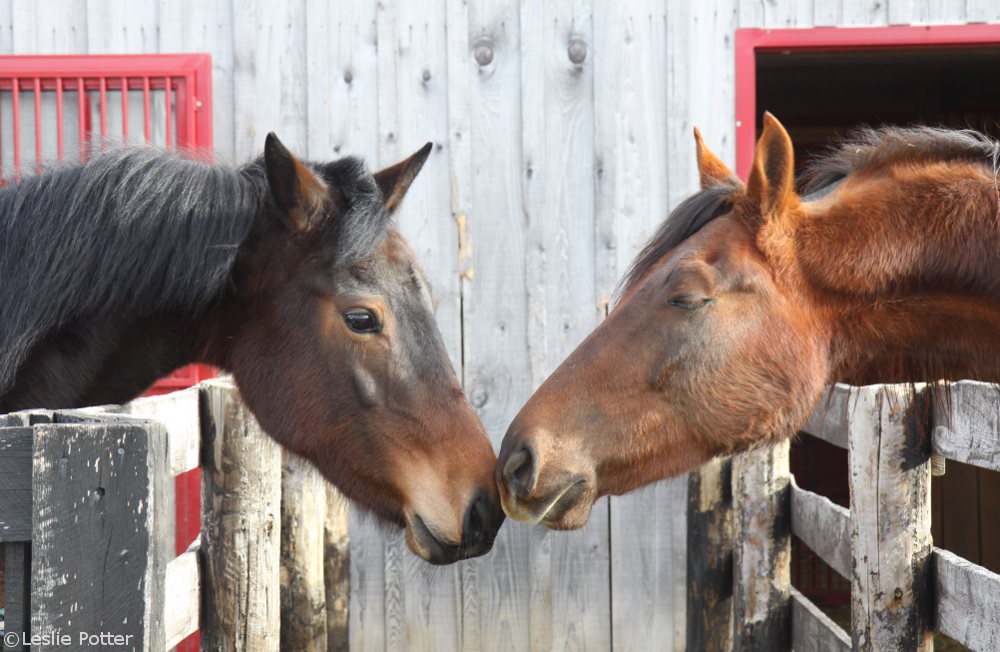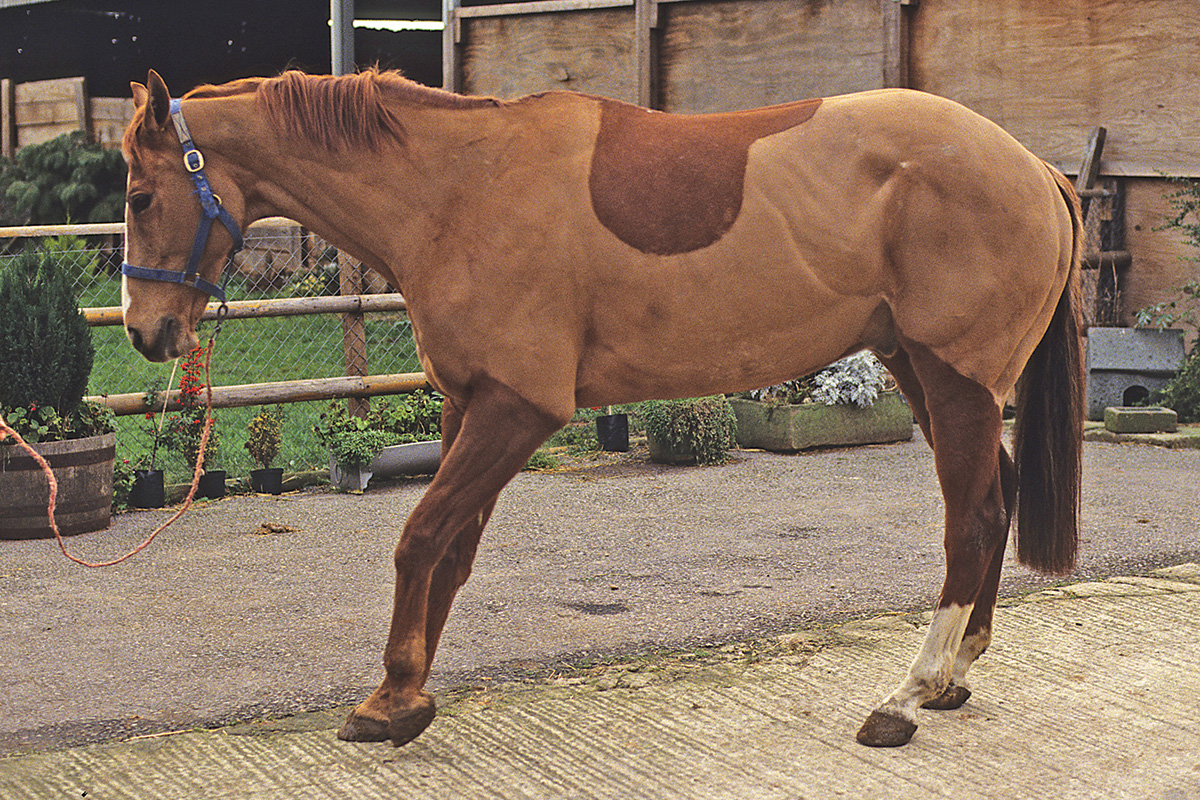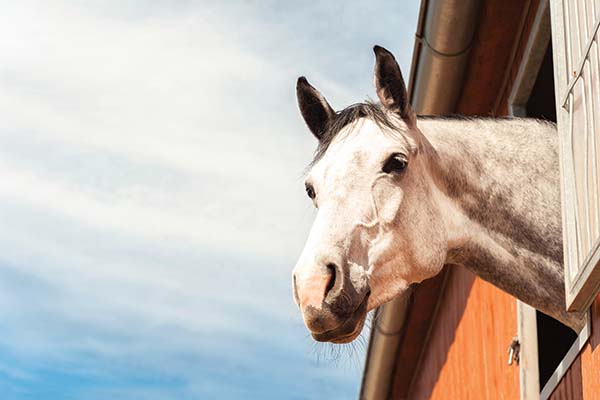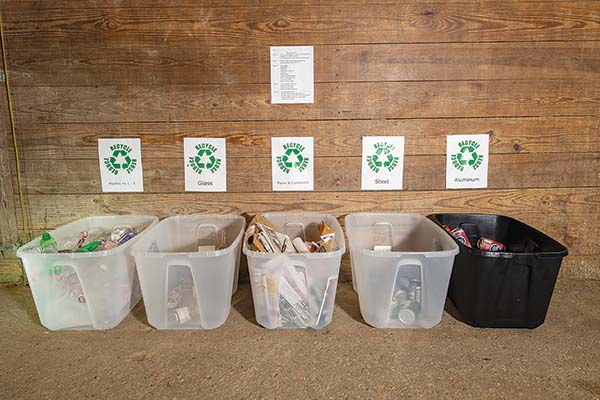
Carrier horses (horses that are clinically healthy, but harbor the disease) are thought to be one of the primary sources for recurring outbreaks of strangles in horses.
Strangles, also known as distemper, is a highly contagious disease among horses. Strangles in horses is characterized by inflammation of the nasal and pharyngeal mucous membranes, with swelling, inflammation and abscessing in the lymph nodes; fever is also common and is generally the first clinical sign.
How Strangles Spreads
Although the disease’s mortality rate is low, the Streptococcus equi bacteria that cause strangles are hardy … but not as strong as we used to think. “Unless conditions are optimal, the bacteria do not survive that long in the environment,” says D. Craig Barnett, DVM, senior equine technical services specialist of veterinary services at Intervet Inc. He explains that the bacteria can survive in water buckets up to 30 days, but will live only a few days to a week on stall walls, fences, soil, et cetera.
Carrier horses (horses that are clinically healthy, but harbor the disease) are thought to be one of the primary sources for recurring outbreaks and can shed the strangles bacteria, particularly during times of stress, for up to a year after infection.
Strangles Vaccination
Robert Holland, DVM, Ph.D., senior technical service veterinarian with Pfizer Animal Health, Equine Division, says that if your horse has had a full-blown case of strangles, you shouldn’t administer a strangles vaccine for one year after recovery.
“The reason being is that the horse’s immune system is ‘tuned up’ to the strangles antigen,” he explains. According to Dr. Holland, vaccination for strangles during this time can wreak havoc with the horse’s immune system. He does recommend vaccination after the year is up following recovery from the disease.
Read more on what horse owners should know about strangles >>






this is helpful to all us girls who finaly get there dream of owning horses. thank you please don’t stop! it might save a horses life one day.
I did not know this. I found the article interesting.
Good.
Interesting. I will make sure to scrub out water buckets and such much more regularly.
This was a very informative article and I’m glad you posted this on your website. I wonder how long it takes for the vaccine to take effect.
I agree with everything that says.Oh,and if your horse or pony does get strangles,make sure no other horses are near the infected horse,and to call a faithful veterinarian near you.
Horse Lover
Was hoping for more detailed information.
Can a horse not have the have the swelling and inflammation of the nasal membranes and just have the abcess appear?
How dangerous is it for yearlings? Please if you have any other infomation, please email me.
wow
Every January our ranch has a strangles clinic. Thoses who do not vacinate find themself in a panic during an outbreak.
Hey!!!
I’d just like to say how great this is I’m learning SO much!!
THANKS!
last year our barn had a outbreak of it. My gelding got a fever but no other symptoms. I immediately quarantined him to his stall. some other people whos horses had swollen glands and fevers kept taking their horses out and walking them all over the facility. Our Barn manager stepped in and had all horses quarantined to the facility, those sick couldn’t leave their stalls. It took 3-4 weeks but It cleared up. my other horses never got it
hum…
I like the article it tells me what i wanted to know about it! How do you know if it is strangles or just a cold?
interesting article
Scary!!!
good article!
Good article and timely for me since my horse has strangles at the moment. Would love to see more in depth information on this disease. Treatment and prevention for horses on the same property as a sick horse.
good information. We are currently having an outbreak in the area. Not fun. But we got through ok.
My daughter bought a 2 yo gelding two days ago, from the, Hurricane Ike situation, I’m pretty sure he has distemper..we can’t afford a Vet right now. What can I do for him? Penicillin? Suggestions? He has Cough, runny snotty nose, the left side of neck has be opened, the right is swollen to the size of a small egg, (under his jaw)..
Interesting article.
Interesting and helpful article. As always! 🙂
What is the current concensus regarding antibiotic use for Strangles
Great information
Great information.
Thank you very much for this information I just moved my horse to a barn that had strangles 5 years ago . and all i heard was puree ?????? for it. I trusted this person at the new barn resupted her because it was brought in her barn from a 4-H horse and then she got a bad reputation and people still wont let it be She takes very good care of all the horses in her barn
My gelding,Bull, died on September 12, 2009 from strangles. The day before, he had the vet examine him because we found a huge lump oozing puss. She said it was nothing and gave us some antibiotics. The next day, a different vet came while he was dying and said the lump was a sign of strangles! I forgave the other vet but I feel terrible thinking I could have prevented this from happening!
This was on heartland!
Good information. I had one colt coming down with strangles, vet said let it run its course, but my farrier told me otherwise. I went with the farrier, because this colt was thin and run down, from being shiipped to an auction.
our horses caught strangles at a horse riding camp/thank god we got em fixed up in time/i now carry a spray bottle of bleach water/wash and rinse/where ever we take em/
This is a good article. I never thought of bringing bleach water to clean the stalls with at shows. Thats a great idea.
This is great! I have a friend who has a mare that recently was diagnosed with strangles. It’s a nasty thing!
Wow, that is scary. I hope I never have to have that happen to my horses.
Even the name is scary.
Years ago, we had a new boarder arrive at my family’s farm. We set up her horse in our barn and as we were standing there chatting, she casually mentioned her horse had strangles! My mom nearly strangled her!!!!!!!! My mom now has new boarders fill out and sign papers stating the current health of their horse(s) and their vet’s info.
My horse was the only horse in the stable that was vaccinated for strangles and he was the sickest. He nearly died. Our vet doesn’t recommend the vaccine. Proper quarantine of new horses and horses that come and go from racetracks and shows is the best preventative for strangles. If you do go to shows bring your own water and buckets, don’t share a trough.
what is pigeon fever, my horse had a lump on his front chest and the next day it started draining ucky yellow stuff..i cant afford a vet so i did research, will my horse be okay since the lump has gone down and is draining
One of my horses had a very severe case of strangles. It spread to a couple of other horses in the barn but they didn’t get as sick.
hum…..
neat
Nice article- maybe talk about prevention more
Good article!
good to know
Great advice! Thanks HORSE CHANNEL!
Good article!
Good article!
Very good article! Thanks HC.
Very useful! Thanks a bunch
How long does strangles last in winter conditions?